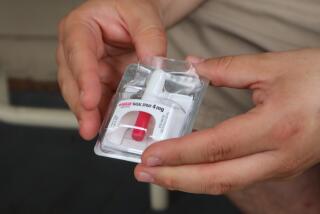Random Drug Tests Sought for Almost All Workers
- Share via
New laws that would subject just about every employed person in California to random drug testing were proposed Monday in separate actions by Los Angeles Police Chief Daryl F. Gates and state Sen. John Seymour (R-Anaheim).
Gates said he wants legislation to allow routine testing of doctors, nurses, police officers, lifeguards, taxi drivers--”the whole gamut of people who are hired to protect lives and whose lives affect health and safety in this state.”
And Seymour said he wants a state law to enable all employers to conduct periodic tests to determine whether their workers are misusing drugs or alcohol.
Adverse Reactions
The proposals--unveiled at separate press conferences in Los Angeles and in Sacramento--brought immediate adverse reaction from the American Civil Liberties Union and organized labor.
ACLU lobbyist Dauphne Macklin said Seymour’s plan for random drug testing may eventually be constructed by the courts as an “unwarranted search.”
Policies requiring that employees submit to drug tests or face dismissal may also violate constitutional bans on forced self-incrimination, she added.
Tom Rankin of the California Labor Federation, AFL-CIO, called Seymour’s proposal a “totalitarian measure” and also expressed doubts concerning its legal viability.
“We think it violates the constitutional right to privacy,” Rankin said. “Discipline in employee relations should be based on job performance, not on drug tests.”
Gates’ proposal, however, drew qualified support from Police Protective League President George Aliano. If the testing is done fairly and impartially, Aliano said, “officers would be in favor of testing, to show they don’t tolerate it, don’t accept it and don’t want it around them.”
‘Very Few . . . Caught’
But “we don’t have a problem,” he said. “Very few officers are caught using drugs.”
Gates said legislation is necessary because the ability to test health and safety workers is now limited. Los Angeles police officers can be tested when they apply for department jobs, he noted as an example, but union agreements preclude random testing thereafter unless there is due cause for suspecting drug use, such as an informant’s tip.
The ability to test is important, he said, because “we’ve had more officers fired for that than at any time in history.” In 1984, there were 14 sustained complaints of drug use against officers, a department spokesman said, a figure more than triple the number a decade ago. And Seymour, who is the GOP caucus chairman, said that critics who question the constitutionality of random drug tests and those who question the reliability of urine samples and other examinations used to detect drug use are overreacting.
He said California industries suffer $18 billion in losses annually, due to drug-related absenteeism, lowered productivity and on-the-job accidents.
“I am convinced that the arguments in support of this concept far outweigh these criticisms,” said Seymour, who appeared at his press conference along with business and industry executives, including Howard Frankel, a former medical director for Rockwell International’s space shuttle project.
Seymour said his bill, if enacted, could stave off anticipated challenges to random testing programs already begun by many California employers, and would encourage companies that might otherwise balk at initiating drug testing programs because of legal uncertainties. He said the bill would also keep employers from “overstepping their bounds” and halt “the proliferation” of local ordinances such as the ban on random drug testing enacted in San Francisco last year.
Many large companies are worried, he said, that contradictory local ordinances might keep them from having a consistent policy for all their employees.
Random Tests Annually
Under his bill, most workers would be subject to random drug tests annually. But a worker “who holds a job in which impairment . . . would present a safety hazard” to other workers or the general public could be tested up to three times a year.
New employees could be required to take drug tests before being hired and those who had previously tested positive during the past year could be tested at any time. The bill is scheduled for a hearing of the Senate Industrial Relations Committee on Wednesday.
Gates’ proposal--which would also include a provision for testing of private investigators and the drivers of vehicles carrying toxic wastes--now goes to the Police Commission.
If approved there, it will become a formal Police Department recommendation, which will then be sent to the City Council for its consideration as the basis for a local ordinance allowing testing of health and safety employees under city jurisdiction, or as a city recommendation to the California Legislature for statewide action.
Kenneth F. Bunting reported from Sacramento and Penelope McMillan from Los Angeles.
More to Read
Sign up for Essential California
The most important California stories and recommendations in your inbox every morning.
You may occasionally receive promotional content from the Los Angeles Times.










